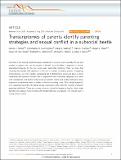Transcriptomes of parents identify parenting strategies and sexual conflict in a subsocial beetle
Abstract
Parenting in the burying beetle Nicrophorus vespilloides is complex and, unusually, the sex and number of parents that can be present is flexible. Such flexibility is expected to involve specialized behaviour by the two sexes under biparental conditions. Here, we show that offspring fare equally well regardless of the sex or number of parents present. Comparing transcriptomes, we find a largely overlapping set of differentially expressed genes in both uniparental and biparental females and in uniparental males including vitellogenin, associated with reproduction, and takeout, influencing sex-specific mating and feeding behaviour. Gene expression in biparental males is similar to that in non-caring states. Thus, being ‘biparental’ in N. vespilloides describes the family social organization rather than the number of directly parenting individuals. There was no specialization; instead, in biparental families, direct male parental care appears to be limited with female behaviour unchanged. This should lead to strong sexual conflict.
Citation
Parker , D J , Cunningham , C B , Walling , C A , Stamper , C E , Head , M L , Roy-Zokan , E M , McKinney , E C , Ritchie , M G & Moore , A J 2015 , ' Transcriptomes of parents identify parenting strategies and sexual conflict in a subsocial beetle ' , Nature Communications , vol. 6 , 8449 . https://doi.org/10.1038/ncomms9449
Publication
Nature Communications
Status
Peer reviewed
ISSN
2041-1723Type
Journal article
Description
This work was funded by UK NERC grants to M.G.R. and A.J.M. an NERC studentship to D.J.P. the University of Georgia and a US NSF grant to A.J.M. and M.G.R.Collections
Items in the St Andrews Research Repository are protected by copyright, with all rights reserved, unless otherwise indicated.

